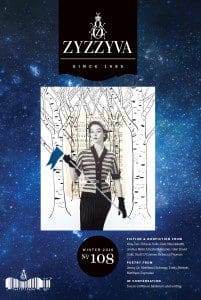On a cool weekday night, I rushed home from my job in San Francisco to my Oakland bungalow to quickly arrange chairs and put out cookies and wine before the guests arrived. They weren’t coming to see me, but rather were going to be there for a reading by an author/actor they had heard me rave about. I copyedited John Mercer’s 2013 collection of memoir pieces, Swearing in English: Tall Tales from Shotgun (a reference to Shotgun Players, the Berkeley theater company he belonged to for 10 years), and his second, The Long Arm of Lunacy: More Swearing in English, […]
Category: News
ZYZZYVA news.
Notes on the First 30 Days
by Laura Cogan
On the morning of Inauguration Day, I met up with a friend in midtown Manhattan, where we rented a car and set out for Washington, D.C. Our plan was to make the drive before nightfall, have a quick dinner, finish making our signs, and get a good night’s rest before the Women’s March. Not only was it less expensive to rent a car than to fly or take a train, but our road-trip had the added benefit of keeping us away from TV all day—a serendipitous media blackout for which we were both grateful. We didn’t turn on the radio, […]
‘Three Wishes’ by Rolf Yngve, ZYZZYVA No. 108, Winter Issue
by me
 Rolf Yngve’s short fiction has recently appeared in Kenyon Review, Fifth Wednesday, Glimmer Train, Indiana Review, and elsewhere. He lives in Coronado, California. His somewhat holiday-themed story—a lone traveller driving along snowy roads—”Three Wishes” appears in the new issue of ZYZZYVA.
Rolf Yngve’s short fiction has recently appeared in Kenyon Review, Fifth Wednesday, Glimmer Train, Indiana Review, and elsewhere. He lives in Coronado, California. His somewhat holiday-themed story—a lone traveller driving along snowy roads—”Three Wishes” appears in the new issue of ZYZZYVA.
In “Three Wishes,” the aforementioned traveller stops to pick up a stranded motorist and her dog. As they drive along, the protagonists’s cell phone may or may not be guiding the trio in ways beyond simply giving directions. The following is an excerpt, but you can read the story in its entirety by getting a copy here.
[…]
‘The Urban Forest’ by Ella Martinsen Gorham, ZYZZYVA No. 108, Winter Issue
by me
Ella Martinsen Gorham is writer in Los Angeles and is at work on a collection of stories. “The Urban Forest,” which appears in the new issue of ZYZZYVA, is her first work in print.
Dan, the protagonist, is a young single man who tries to keep his life as orderly as possible. His efforts to stay in control are challenged when he buys a house and realizes the tree that comes with it constantly splatters his property with “rank-smelling berries.” The huge tree is also home to the neighborhood’s feral parrots. The following in an excerpt of “The Urban Forest.” You can read it in its entirety in Issue No. 108, which you can get here. (Ella Martinsen Gorham will also be reading with Matthew Zapruder, Kathleen Alcott, and Scott O’Connor at ZYZZYVA’s Winter Issue Celebration at Diesel in Oakland on Thursday, January 26.)
[…]
‘Flood Control’ by Rebecca Thomas, ZYZZYVA No. 108, Winter Issue
by me
 Rebecca Thomas, who is currently working on a novel, has had her work appear in Prairie Schooner, The Massachusetts Review, Gulf Stream and other publications. Her essay, “Flood Control,” appears in the new issue of ZYZZYVA.
Rebecca Thomas, who is currently working on a novel, has had her work appear in Prairie Schooner, The Massachusetts Review, Gulf Stream and other publications. Her essay, “Flood Control,” appears in the new issue of ZYZZYVA.
An English instructor at West Virginia University, Thomas grew up in Orange County. Though known as a region afflicted by drought, Southern California has long had to contended with deluge, too. “Flood Control” is Thomas’s examination—personal and historical—of a place’s fraught relationship with water. The following in an excerpt but you can read the essay in its entirety by getting a copy here.
[…]
Letter From the Editor
by Laura Cogan
The following Letter from the Editor appears in the Winter issue. It was originally written a few days before Election Day. “What is essential is the intense presence of the viewer in the intense presence of the art.”—Edward Albee Dear Readers, For eight years I lived in New York, and during that time I took in a reasonable amount of theater, on, off, and off-off Broadway, whenever and wherever I could get tickets. There was, as you can imagine, a great deal of serious and experimental work to choose from, which was particularly fortuitous because my graduate work was in part […]
Donald Trump Reviews Ingmar Bergman’s ‘The Seventh Seal’
by Andrew David King
Stars: 10/10 Bergman. You know, people said he wasn’t as good as Dreyer. They said it. They said he couldn’t do it. He did it, though. He really went and did it. I mean, people are worried about death. Capital-D Death. They want answers, they’re dying, they’re not happy. So this guy, big handsome-looking Norwegian guy, European guy, you know, he plays chess with Death. Death doesn’t know what to do, he’s like, “I’ve never seen anything like this before.” It’s true, folks. Never before—no one’s ever seen this before. They keep playing, they’re on a beach, it’s great. There’s […]
In the Winter Issue
by ZYZZYVA
Our Winter issue features fiction, nonfiction, and poetry: “Throwback Thursday” by Joshua Mohr: online, it’s the appearance of happiness that matters most. “Revision” by Mar Colón-Margolies: on assignment covering Texas’s abortion laws, a journalist considers the line between his humanity and his profession. “Wild Kingdom” and “World Away” by Octavio Solis: the tenacity of adolescent memories reveal themselves in a father’s explosive anger and in a school production of “The Diary of Anne Frank.” “Operator, Information” by Glen David Gold: picking up from Issue No. 100’s “The Plush Cocoon,” we offer another installment from Gold’s forthcoming three-volume memoir. “Flood Control,” […]
Where to Donate Your Abilities: A Sampling of Bay Area Community Organizations
by Caille Millner & Mauro Javier Cardenas
These are difficult days for writers, editors, teachers, and intellectuals of all kinds. Faced with fresh evidence of Auden’s claim that “poetry does nothing,” in the persona of President-elect Donald Trump, the temptation we face is to turn toward despair and disengagement. Yet this is the time we were made for. Now we must help each other to find our voices in the public sphere. What we’ve found to be helpful is combining our abilities—as storytellers, witnesses, and listeners—with a community commitment. The Bay Area has a surfeit of both literary talent and social justice work. The local organizations we’ve […]
Solidarity: A Letter from the Editors
by me
Friends, In general, we keep partisanship and day-to-day politics out of the journal. We hope we can provide a space for thoughtful contemplation of all aspects of contemporary life through art—a way of thinking which, while engaged with the political, is not political in its mode and does its work well outside the 24-hour news-cycle. But we are now compelled to speak to you directly about this election. On November 8, this nation succumbed to the greatest threat that faces any democracy: that a sizable number of its people may find democracy itself—with all its imperfections—too unpalatable, and choose instead […]
Finding in Music What Language Lacks: ‘A Greater Music’ by Bae Suah
by John Gibbs
Communication, or a lack thereof, is front and center in A Greater Music, (128 pages; Open Letter Books; translated by Deborah Smith) Bae Suah’s latest novel to come out in English. Our music-loving narrator is an unnamed Korean woman living on and off in Berlin and Korea, struggling to learn German. Her difficulties in the structure and rigor of academia are documented throughout, up until she meets M, an unconventional tutor who teaches with wild disregard of basic grammar and syntax in favor of a higher learning and exchange of ideas. Presented near the novel’s conclusion is their initial meeting. […]
What’s There to Be Afraid Of?: Some Long-Lasting Works of Horror
by ZYZZYVA Staff
When my best friend read Charles Burns’s graphic novel Black Hole at age eleven, her parents assumed it was a harmless comic book. They were sorely mistaken, and, in her own words, Black Hole messed her up. How bad could it be,? I thought, flipping through the weighty twelve-issue collection. Black Hole is set in Seattle during the mid-1970s, when a horrific STD plagues a small suburb. Only teenagers can contract “the bug,” and like the AIDS epidemic, the town is initially unsure of how it spreads. The disease manifests itself in a variety of disturbing ways. Adolescence is already […]
